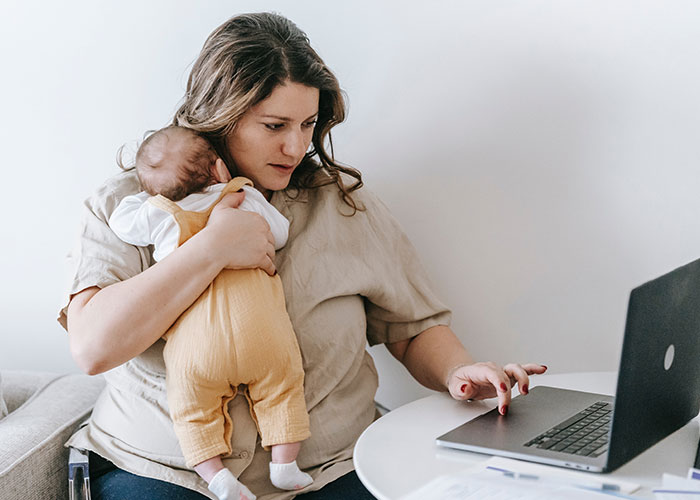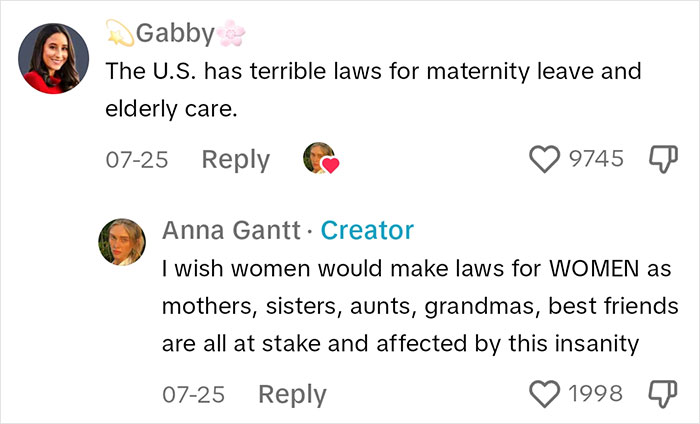We all know that becoming a parent is one of the most challenging roles a human can take on. So why is it that some governments refuse to provide support and resources to ensure that moms and dads are set up for success?
New mom Anna Gantt recentlyshared a ranton TikTok calling out the unfortunate state of maternity leave in the United States, and her video quickly went viral among viewers who could relate. Below, you’ll find the post Anna shared that sparked this discussion, as well as conversations with Anna and Co-founder and Executive Director ofChamber of Mothers, Erin Erenberg.
All new parents look forward to spending time bonding with their little ones

Image credits:annavgantt
So when this mother realized that many American moms return to work only weeks after giving birth, she couldn’t help but call out the system

“You want to know what’s [messed] up? American maternity leave”

“I thankfully have not suffered from postpartum anxiety or depression. But if I did, work would be the last thing on my mind”

“And I can’t imagine being in the position where you must go back to work in order to survive, in order to provide for your family with dual income, or if your partner is not working and you’re the one that’s responsible. That must be awful. I thankfully work from home but hitting six weeks and knowing that this is when most women return to work here in the United States is insanity.”
“People I know have been given the 12-week maternity leave but asked to return sooner. This is crazy”

“My friends in other countries are guaranteed six months paid leave up to a year, two years. I have a friend who just got two years paid maternity leave that included six months for her husband, so that the parents can, I don’t know, parent. I’m 24 years old. We need to change this in my generation. We need to make this unacceptable. And my heart goes out to any mother who has to return to work sooner than when she’s ready.”
You can hear Anna’s full rant right here
“There is no way that the beginning weeks or months of an infant’s life can properly be balanced while being forced to work full-time”
We got in touch withAnna Ganttto discuss why she shared this video in the first place, and she opened up about how becoming a mother has impacted her understanding of how unfortunate the state of maternity leave is in the US. “Having my daughter Misha hit home,” she shared. “My time became our time, and my priority shifted to all of Misha’s wants and needs. There is no way that the beginning weeks or months of an infant’s life can properly be balanced while being forced to work full-time.”
Anna says she was lucky enough to be given as much maternity leave as she wants, but she knows this is a rare privilege in the US, especially in the South. “Becoming a mother made me hurt for all of the parents, especially mothers, who have just given birth and aren’t promised the 12 week maternity leave that many American employers argue is ‘enough time,’” Anna continued. “It just isn’t, and I would argue that our bodies aren’t even healed to return to a 40 hour week schedule at 5 or 6 months postpartum. There is a reason doctors advise mothers to wait at least a year before having another child, and I cannot believe our government continues to abuse the lack of protection for infant children and parents who deserve better.”
We were also curious why Anna believes the US is so far behind when it comes to maternity leave. “For the same reasons we are so far behind in other ways- healthcare, childcare, and overall social services,” she noted. “I believe that it is our government’s mission to keep our protective laws surrounding women as archaic as possible, otherwise, it wouldn’t seem very ‘American’ would it?”

“The United States is hardly a ‘developed nation’ and is rightfully ranked last for maternity/paternity leave laws”
Americans, however, are currently at the mercy of their employers for maternity and paternity leave. “As you can imagine, this varies greatly, and often leaves mothers with no choice other than returning to work prematurely and leaving their newborns with strangers at expensive and often crowded nurseries,” Anna pointed out. “The United States is hardly a ‘developed nation’ and is rightfully ranked last for maternity/paternity leave laws.”

Image credits:Sarah Chai (not the actual photo)
“We know our mothers deserve better”
“Mothers around the world shared their maternity leave laws and made many American parents understand how little our government cares about the wellbeing of childhood development, which begins at home,” Anna shared.“I, as a 24 year old mother, hope that it will be our generation to vote for change. Outdated policies are actively harming our children who will become the next adults in our nation, and so, we desperately need universal care that encourages parents to spend quality time with their babies, and take on equal responsibility for the optimal healthy outcome for American families. Maternity and paternity leave is one of many improvements the U.S. has to rewrite for our healthcare to even compare with other nations, but I know it is in our future.”
We also reached out to Erin Erenberg to hear her thoughts on this important topic. Erin is a mother of three, attorney, Co-founder and Executive Director ofChamber of Mothersand Founder and CEO ofTotum. Erin is a passionate advocate for paid maternity leave in the United States, and attributes the US being so far behind to a few factors: capitalism, representation, and women being the default caregivers.
Image credits:~jar{} (not the actual photo)

“There is no data to support that parents, particularly mothers who are healing from childbirth, are ready to reenter the workforce at 12 weeks”
Erin also pointed out that the US has three times more senators named John than senators who are mothers of minors. “We are yet to see a female president. There is an empathy gap at the top,” she says. “Beneath all of this, though, is this outdated idea that women should duck out of the workforce after having children. We see again and again that women default into caretaking roles, and men benefit financially in a system that values economic output over the value of care.”
We also asked Erin what she believes would be an appropriate amount of leave and compensation for new parents. “The default in the US is 12 weeks, but there is no data to support that parents, particularly mothers who are healing from childbirth, are ready to reenter the workforce at 12 weeks,” she explained. “12 weeks was a compromise decided during the fight for unpaid time off under the Family and Medical Leave Act (FLMA), and it hasn’t changed for 30 years.”

Image credits:Karolina Grabowska (not the actual photo)
“If we’re going to be truly pro life, we have to offer paid leave and access to affordable quality childcare”
“6 months’ leave would be a place to start that takes into consideration a birth mother’s time to heal, parental bonding for both partners in a two-parent household, and adequate time for feeding, sleep, and other basic developmental milestones to come together,” Erin continued. “If you look at how much time an at home parent takes to care for their child before feeling like they can reenter the workforce, it’s more like 12-18 months. If our neighbors to the North in Canada can make 18 months work, we should at least be able to offer 6 months,” the expert added. “But recent fights for leave in the US, like the one in 2021, have begun with that FMLA placeholder of 12 weeks.”
“If we’re going to be truly pro life, we have to offer paid leave and access to affordable quality childcare,” Erin says. “Without that basic care infrastructure, parents and children aren’t thriving. It’s no coincidence that the US has one of the worst maternal mortality rates among peer nations, as we strip away reproductive freedom and offer zero care infrastructure but pretend to be pro life. Change is desperately needed, and we believe that mothers will create that change if we unite to demand it.”

Image credits:Keira Burton (not the actual photo)
Viewers echoed Anna’s sentiments in the replies and pointed out how much better maternity leave is in other nations













Social Issues